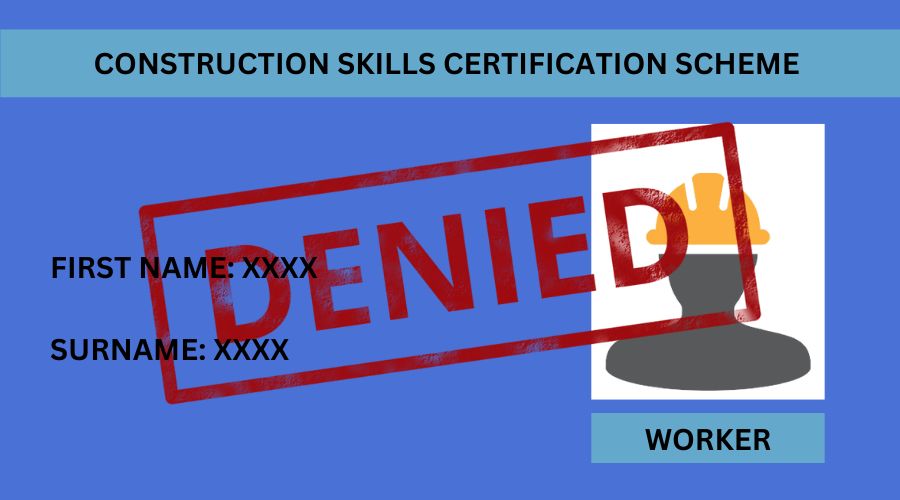An industry veteran has criticised the requirement for construction workers to acquire a national qualification to retain their CSCS card privileges.

by Rory Butler / March 7, 2023
Get industry news in 5 minutes!
A daily email that makes industry news enjoyable. It’s completely free.
Mr Sinclair*, a senior project manager in the South West of the UK, published a critique of the Construction Skills Certification Scheme reform online, saying the changes could put a ‘significant financial burden on workers and cause undue stress’.
While Mr Sinclair acknowledged a properly trained and qualified industry is a “commendable” aspiration, he nonetheless said the initiative disproportionately affects long-serving workers in construction whose livelihood could suffer.
What is happening?
From 30 June 2024, the CSCS will no longer renew Industry Accredited (IA) cards. Further, cards issued from 1 January 2020 expire on 31 December 2024 and will also not be reissued. Workers who intend to renew their CSCS card must reapply in 2024 and acquire a National Vocational Qualification (NVQ/SNVQ) or equivalent competency.
The CSCS card is sanctioned by the Construction Leadership Council (CLC) to ensure competency across the industry. And while it is not a legal requirement, the credential is nonetheless requisite by most employers. The reform, announced in 2019, effectively dispenses with workers being able to obtain CSCS cards on the strength of an employer’s recommendation, or “grandfather rights”.
But Mr Sinclair urged the CSCS to rethink its reforms, arguing for financial support and an extended timeline to acquire the NVQ, and an ‘experience-based criteria’ for certain workers instead of the national qualification. His online plea sparked a lively debate, receiving around 230 comments and more than 80,000 impressions.
Grants available
In response, the CSCS said those required to undertake further training can do so via on-site independent assessments completed in the workplace or remotely – though paid for by employers.
To support the transition from an Industry Accredited (IA) card to an NVQ, it also said workers can approach the Construction Industry Training Board (CITB) for a grant (specific supervision S/NVQs: £1,250; specific management S/NVQs: £1,500).
“Industry Accreditation allowed workers to obtain CSCS cards on the strength of an employer recommendation, rather than the achievement of a recognised qualification,” said the CSCS.
“CSCS announced the decision to withdraw the Industry Accreditation route to a CSCS card in 2019, in order to satisfy Construction Leadership Council requirements, which state that all construction industry card schemes must operate with nationally recognised qualifications in place for all occupations by the end of 2024.
“For many IA card holders there are straightforward routes off IA via existing qualifications they may already hold or through professional body memberships. Many will no longer require a CSCS card as they now work in a non-construction related role.
“Those who are required to undertake further training to gain a qualification will not need to attend college as there are various assessment methods available including professional discussions and on-site assessments, which are often completed in the workplace or remotely.
“In addition, to support construction workers transition from an IA card to a qualification, CITB are increasing the grant for specific supervision S/NVQs to £1,250 and specific management S/NVQs to £1,500.”
‘A burden for many’
“As a construction worker, I am deeply concerned about this recent announcement made by the Construction Skills Certification Scheme requiring workers to have an NVQ to retain their CSCS card,” said Mr Sinclair. “This new rule has caused significant stress and financial burden for many construction workers, who may not have the means or resources to obtain an NVQ.
“In my opinion, the CSCS should have taken a different approach to addressing this issue. One alternative could have been to provide financial assistance for workers to obtain an NVQ. This could have taken the form of a grant or loan programme to cover the cost of training and testing.
“Additionally, the CSCS could have implemented a phased approach, giving workers a reasonable amount of time to obtain an NVQ before the new rule takes effect. Another option that the CSCS should have considered is to allow for alternative forms of qualification that are equivalent to an NVQ. For example, recognising other industry-specific certifications or training programmes as equivalent to an NVQ would have given workers more options to retain their CSCS card without having to go through the financial burden of obtaining an NVQ. Additionally, the CSCS should have also considered providing more flexibility in the form of CSCS card types.”
‘Experience over testing’
He added: “Another example I would like to give is for workers who have been working for a long time in the industry and have the experience but not the NVQ: a different type of card that recognises experience and skill but not that which the NVQ could have created.
“While the CSCS’ goal of ensuring that construction workers are properly trained and qualified is commendable, the new rule has caused undue stress and financial burden. By providing financial assistance, implementing a phased approach, recognising alternative forms of qualification, and providing more flexibility in the form of card types, the CSCS could have better addressed our concerns while still achieving its goal.”
For further information about the guidance and support available to those impacted by the withdrawal of IA, individuals should visit CSCS.uk.com/IA.
*Name changed at the request of the interviewee.
